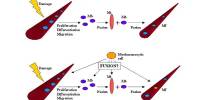In the study, mice were fed a high-fat diet and injected with the chemical AP39, which delivers hydrogen sulfide directly to mitochondria in cells. The study concluded that the medication considerably decreased the rate of weight gain, with an average reduction of 32% over the course of 12 weeks. The researchers also discovered that the medication reduced fat deposition in the liver, which is a consequence of obesity and can cause severe inflammation.
New research suggests that therapies that deliver hydrogen sulfide to cells could one day be used to develop new treatments for obesity and related disorders.
Increasing data suggests that hydrogen sulfide plays a crucial role in the liver. Previous study has shown that a trace amount of hydrogen sulfide in the body regulates how the liver consumes fat, but until recently, there was no method to do so directly. It also affects the function of mitochondria, the “powerhouse” of cells that generate energy.
Our findings show that AP39 slows weight gain and significantly reduces multiple obesity markers in mice. This is really exciting, and we think it signals the start of a new era in the development of a revolutionary therapeutic approach for metabolic illnesses that uses hydrogen sulfide to modify the body’s signalling mechanisms.
Dr. Aneta Stachowicz
The new study is led by Jagiellonian University Medical College in Poland and the University of Exeter and published in Pharmacological Research. In the research, mice were fed a high-fat diet were injected with the compound AP39, which delivers hydrogen sulfide direct to mitochondria in cells The research concluded that the treatment significantly slowed the rate of weight gain, reduced by 32 per cent on average, over the 12 weeks of the study. The team also found that treatment reduced the accumulation of fat in the liver, which can be a complication of obesity and can lead to harmful inflammation.
AP39 was developed at the University of Exeter and is now held by its spin-off business MitoRX Therapeutics. The study discovered that AP39 treatment in mice lowered the activity of liver enzymes that help manufacture certain toxic lipids in the body, build proteins that transport fat, and regulate critical signals that can be harmful to the liver. It also reduced the liver’s generation of new lipids by inhibiting the activation of an important unfavorable metabolic pathway (mTOR/SREBP1/NF-kB).

Matt Whiteman, Professor of Experimental Therapeutics at the University of Exeter Medical School, started investigating the role of hydrogen sulfide in the body in 2004. He first observed that overweight persons with type 2 diabetes had lower levels of hydrogen sulfide in their bloodstream. This was measured by their level of body fat. Lower blood sulfide levels were associated with higher body fat content, resulting in worse sugar regulation and more insulin resistance. This suggested that pharmacological molecules that replaced the missing sulfide could prevent or reverse these detrimental effects.
Professor Whiteman said: “These early findings suggested that hydrogen sulfide could one day play a role in treating diabetes, obesity and complications arising from having too much fat in the body. Today, obesity is a growing global health challenge, and new and better treatments are desperately needed. If our findings that hydrogen sulfide-generating molecules that target mitochondria significantly slow weight gain translate to humans, we could be looking at an exciting new option for treatment. It is gratifying to translate these observations toward clinically viable and better drugs with MitoRx.
Dr. Aneta Stachowicz, Department of Pharmacology at the Faculty of Medicine, Jagellonian University Medical College, Poland, and lead author of the Pharmacological Research paper, stated, “Our findings show that AP39 slows weight gain and significantly reduces multiple obesity markers in mice. This is really exciting, and we think it signals the start of a new era in the development of a revolutionary therapeutic approach for metabolic illnesses that uses hydrogen sulfide to modify the body’s signalling mechanisms.”
Dr Jon Rees, Chief Executive Officer of MitoRx, said: “This publication is a major step in MitoRx advancing our therapies which target mitochondria, and shows the huge potential for mitochondrial-targetted sulfide donors (mtH2SDs) targeting a new pathway for treating obesity. Powerful international research collaborations like this help speed therapeutic advances to patients.”
















